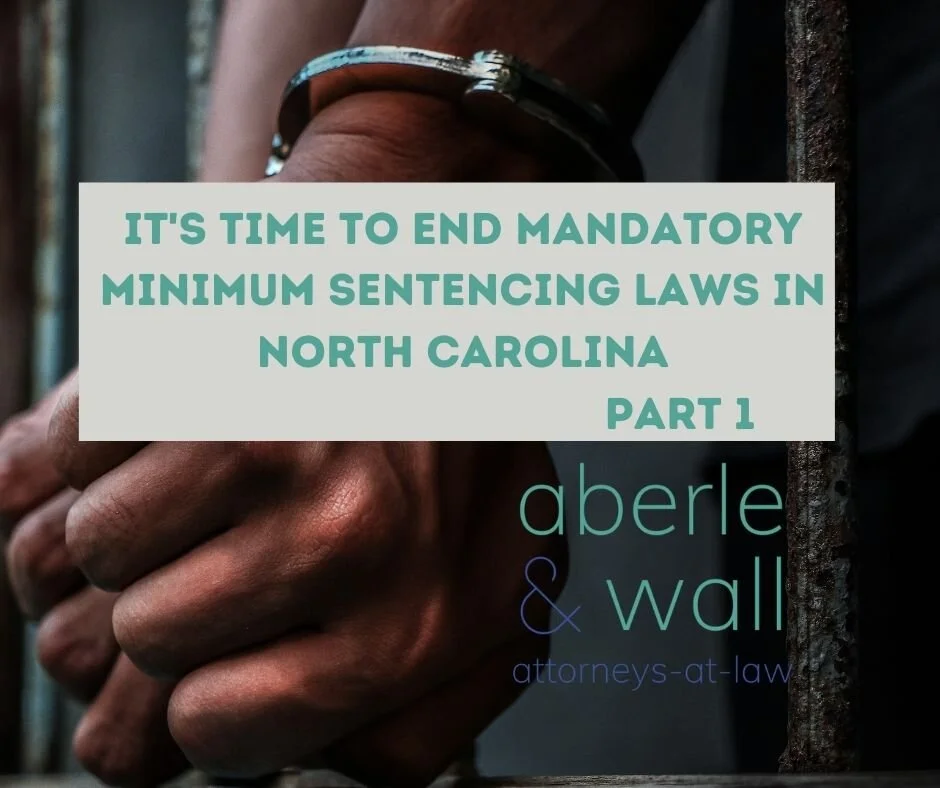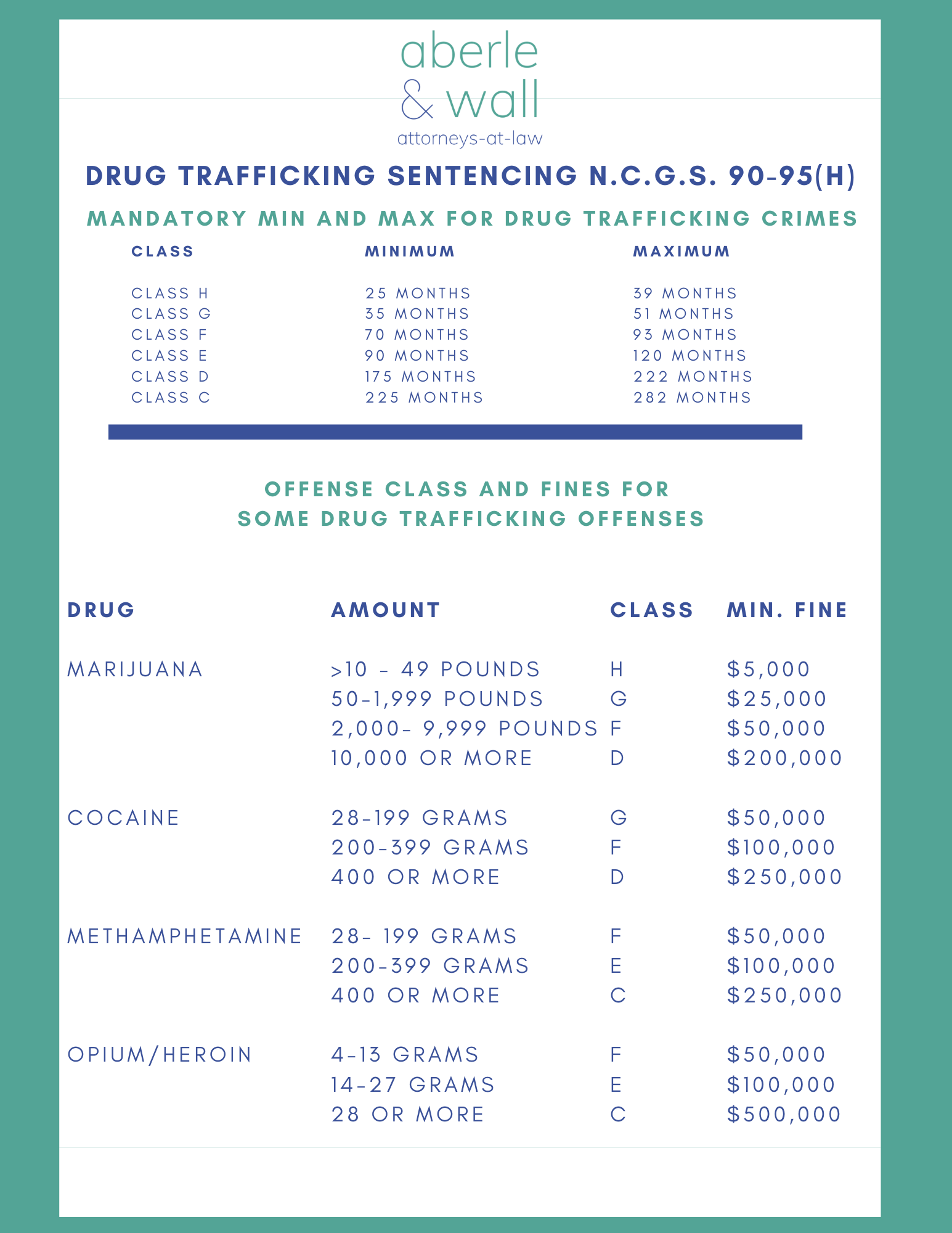It’s Time to End Mandatory Minimum Sentencing Laws in North Carolina (Part I of III)
Brennan Aberle, Partner
Aberle & Wall
This blog post is part of a three part series on North Carolina’s mandatory minimum sentencing laws for drug trafficking. Each part follows the story of a defendant based on a real client. Part 1 provides a basic explanation of North Carolina’s drug trafficking and mandatory minimum sentencing laws. Part 2 focuses on the social harms of mandatory minimum sentencing and a recent reform bill that the North Carolina General Assembly passed in June of 2020. Part 3 explores what a criminal justice reform bill might look like that abolishes or substantially reduces the impact of mandatory minimum sentencing laws, while still holding real drug traffickers accountable.
An All Too Familiar Story
Here is a nightmare scenario that is not unlike several of the cases that I have had as a defense attorney: Aaron and his friend are barely 19 years old. His mom still thinks of Aaron as the baby. She scolds him from time to time for making immature decisions, but he is essential to helping her take care of the house. Aaron’s friend is down on his luck and foolishly agrees to play a small part in a drug sale to make some extra money. A dealer gives him 15 hydrocodone pills and tells him to drive to an address, give them to a buyer and bring the money back. The dealer promises to give Aaron’s friend a small portion of the money as his cut. On the way to the buyer, his friend picks Aaron up to hang out and tells him that he has to make a couple of stops real quick. He tells Aaron what is going on and though Aaron knows it is wrong, he and his friend have no criminal record at all, and he decides to ride along. Plus, some people have a prescription for hydrocodone, so how much trouble could they get in? Aaron really isn’t that much different from many people in our families who we know and love, but may not always think everything through.
Aaron waits in the car as his friend pulls up to the buyer’s house. The buyer, however, is working as a criminal informant for the police because he has his own drug trafficking charges pending and needs to help create other crimes and get those people busted to get a better plea deal. Aaron and his friend are both arrested shortly after the sale. They are both charged with four separate drug trafficking felonies for committing one drug transaction: trafficking opium by possession, trafficking by transportation, trafficking by sale and conspiracy to traffic opium. In the best case scenario if Aaron is found guilty of just one of the four charges, he is facing a mandatory minimum sentence of six years and ten months in prison and could be facing a minimum of 23 years if a judge wanted to run all four of the felony convictions consecutively. Mandatory minimum sentencing means the judge has absolutely no choice but to give you that active sentence, no matter what your record is. The person with the best record and the person with the worst record are often sentenced exactly the same.
Of course, this is assuming that the weight of those 15 pills is between 4 and 13 grams. If those pills end up weighing between 14 and 27 grams, Aaron’s mandatory minimum sentence is 7.5 years and he is looking at potentially up to 30 years in prison. If those pills weigh 28 grams or more, the mandatory minimum is 18.75 years and the minimum for all four felonies, if they ran consecutively, is 75 years! Unless these charges are dismissed or reduced, the only legal way a judge can go below the the mandatory minimum prison term is for Aaron to voluntarily endanger himself by offering his service to help get someone else charged with serious drug offenses, sometimes by creating crimes that would not otherwise happen. For many people like Aaron, however, he doesn’t know any high level drug traffickers to try and set up.
Aaron, a 19-year-old kid, now faces some tough decisions. He can take his case to trial and a jury might believe that he didn’t play an active role in the crime. If he wins, maybe he gets to go home from jail, where he has been stuck for over a year or more awaiting trial because he can’t afford his bond. If he loses, he may be in prison so long he misses out on a significant portion of his life: his grandmother’s funeral, the birth of his niece, his sister’s graduation, the birth of his own child, etc. He can try to provide substantial assistance and attempt to help put someone more serious than him behind bars with only the hope that a judge will give him less than the mandatory minimum. This course of action, however, might put a target on his back from a dangerous drug dealer. Furthermore, if he tries to set up a sting operation on a serious drug dealer, who knows what untold violence may have been committed getting the drugs to the purchase location? Those drugs might have crossed international borders just to set up a local drug dealer in a crime that would not have occurred but for a government-induced false drug buy. Maybe Aaron gets lucky and a District Attorney agrees to reduce the charges to a less serious felony. Then what? He must decide between potentially pleading guilty to a felony he didn’t commit to avoid spending potentially decades in prison.
It is an impossible choice, because there is too much risk in exercising your right to go to trial. When a mandatory active sentence that large is in play, there is an imbalance of bargaining power between a District Attorney and a Defendant. A world with mandatory minimum sentencing tears families apart, leads to bad public policy results, and has done little to curb the flow of drugs into the community, while leaving thousands of disproportionately young black men in prison.
Read more heartbreaking true stories here and here.
Drug Trafficking Laws in North Carolina
We will come back to these public policy problems in part two of this story, but let’s pause for a moment and talk about North Carolina’s drug trafficking laws and how we get to these staggering potential prison sentences. Maybe your stereotype of a drug trafficker is someone who is smuggling drugs over state or country borders, but in North Carolina, you can be charged with drug trafficking simply by being in possession of certain quantities of drugs. These laws are written in such a way that it always seems that defendants are being charged with 3 to 4 different serious trafficking offenses for committing a single crime. You might be asking yourself:
Wait. How can you be charged with trafficking by possession and trafficking by sale or transportation? Don’t you have to be possessing it to sell it or transport it? Seems like getting punished for the same crime twice. Doesn’t “double jeopardy” cover that?
Well guess what? No. Sometimes the great and merciful plea offer you get, is the grand prize of only pleading to one trafficking charge with a mandatory minimum sentence rather than 3 or 4 separate crimes that a judge could give you consecutive mandatory prison sentences for. It can seem like a cruel consolation prize that you get to experience an excessively long prison sentence just to avoid one that is even more unconscionable.
It gets worse, too. The statutes that govern most trafficking crimes don’t require the weight to be determined by a pure substance. Most hydrocodone pills are not actually pure hydrocodone (derived from opium). Many actually include a number of inactive ingredients and simple acetaminophen. One pill might weigh a gram, but only actually contain a few hundred milligrams of hydrocodone. That doesn’t matter for many of the trafficking statutes. Here is the one for opium that covers hydrocodone pills:
North Carolina General Statute 90-95(h)(4) - Any person who sells, manufactures, delivers, transports, or possesses four grams or more of opium, opiate, or opioid, or any salt, compound, derivative, or preparation of opium, opiate, or opioid (except apomorphine, nalbuphine, analoxone and naltrexone and their respective salts), including heroin, or any mixture containing such substance, shall be guilty of a felony which felony shall be known as "trafficking in opium, opiate, opioid, or heroin" and if the quantity of such controlled substance or mixture involved:
a. Is four grams or more, but less than 14 grams, such person shall be punished as a Class F felon and shall be sentenced to a minimum term of 70 months and a maximum term of 93 months in the State's prison and shall be fined not less than fifty thousand dollars ($50,000);
b. Is 14 grams or more, but less than 28 grams, such person shall be punished as a Class E felon and shall be sentenced to a minimum term of 90 months and a maximum term of 120 months in the State's prison and shall be fined not less than one hundred thousand dollars ($100,000);
c. Is 28 grams or more, such person shall be punished as a Class C felon and shall be sentenced to a minimum term of 225 months and a maximum term of 282 months in the State's prison and shall be fined not less than five hundred thousand dollars ($500,000).
Let’s break down that bold sentence. The weight is based on the total mixture containing that substance. That means the whole pill counts towards the weight, even if it is 1% opium. As you can imagine, this can lead to some wild scenarios. A single grain of opium in a 10 kilogram barrel of sugar becomes trafficking in 10 kilos of opium. To be fair, there are completely valid concerns about punishing a large quantity of a mostly harmless substance because there will always be danger when anyone even falsely believes they are dealing with 10 kilos of opium. But should a kid with 27.9 grams of sugar and 0.1 grams of heroin be charged with the exact same crime as an international drug trafficker charged with 50 kilos of pure heroin? Of course not, but the law is written to treat these two people the same.
Mandatory Minimum Sentencing Laws
For most crimes that aren’t drug trafficking, North Carolina uses a structured sentencing system. It is a system that needs reform, but it generally makes sense. That means that the worse your crime is, and the more serious your record is, the greater punishment you get. For felonies, it works by using a grid system. The y-axis represents the different classes of felonies. The x-axis represents your criminal record level determined by how many prior criminal history points you have. You then match up the crime and record level and discover a box that has the range of number of months you will serve in prison. Here is a link to show you what that looks like. As you can see, there are plenty of boxes with very serious amounts of jail time in them that would allow us to punish drug traffickers without adding the need for a mandatory minimum sentence that throws this chart out of the window.
Mandatory minimum sentencing completely throws away this logic by punishing the clean record 18-year-old and the 45-year-old violent career criminal exactly the same. It relies on using excessively Draconian punishments to deter crime (with debatable efficacy) or to simply incarcerate (many non-violent) citizens for years and years in prison. These offenses also come with exorbitant fines that devastate families and leave them with terrible credit when (and if) they are ever released from prison. The length of these trafficking sentences only depending on the type and quantity of drug, not your criminal record. Here are some examples:
A plea bargain often relies on a prosecutor and a defense attorney each having something to benefit from making a deal and avoiding a costly or lengthy jury trial. The power to wield a multiple decade sentence for a non-violent crime over a defendant’s head if they choose not to accept a deal creates an imbalance in this bargaining power and deters people who should take their cases to trial from doing so. It can also undermine the public’s confidence that only guilty pleading are pleading guilty. Imagine being innocent of a drug charge and being told that if you go to trial on several drug trafficking charges, you may spend 30-75 years in prison, but if you plead to a reduction to Felony Possession of Heroin (which is still a felony but has no mandatory minimum) you will get probation. Innocent people take those plea deals because exercising their right to a jury trial carries such an enormous risk.
Fortunately, there is a reason to have hope. There is a growing bipartisan movement in the United States towards criminal justice reform, particularly on mandatory minimum sentencing. Democratic and Republican legislators on both the state and federal level have expressed interest in reform. There are groups as diverse politically as the Charles Koch Institute (yes, the infamous Koch brothers) and Conservatives for Criminal Justice Reform to the ACLU and Families Against Mandatory Minimums. As we will see in Part 2, however, some policy achievements in North Carolina have been simply a bandaid on a broken leg and the time is right for meaningful reform.


